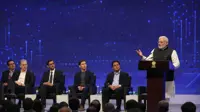"Big bull" Mr. Sinha gets the stock markets booming
By Alok Agarwal | 28 Feb 2001
It was a label that fitted well the legendary late Mr. Pherwani, chairman of UTI and could well be the new label finance minister, Mr. Yashwant Sinha, would carry, if the initial reactions to his fourth budget presented to parliament is anything to go by. With a clear agenda to spur growth in the country, Mr. Sinha presented an unexpectedly refreshing budget that has industrialists, like Mr. Rahul Bajaj, excited enough to predict the stock exchange index to reach 5,000 points in a week. Up from its current levels at 4,100 plus. Enough to confer the title of "big bull" of the honourable finance minister.
The euphoria of a soft budget has yet to die down and despite the fact that the leading index, the sensex, only gained 177.36 points by close of trading today, the mood is upbeat. So upbeat, that some leading fund managers like Mr. Gul Tekchandani, chief investment officer of Sun F&C Mutual fund, are predicting the index to cross 6,000 points by the end of this calendar year.
Clearly Mr. Sinha has taken every one by surprise! But what has Yashwant Sinha done? Plenty, if his two-hour speech is anything to go by.
- In keeping with strict economic principles, he has reduced interest rates on small savings so as to bring down the cost of the economy, leaving the rest to the stock markets.
- He has managed to present a savings based, growth oriented budget, which could push up the GDP growth to around 6.5 per cent to 7 per cent in fiscal 2002.
- Markets like fiscal prudence and Sinha has done well by limiting fiscal deficit to the targeted 5.1 per cent for fiscal 2001 and has further pegged it at 4.7 per cent for fiscal 2002 in the budget.
- For the fourth year in row he has managed to cut non-plan expenditure
- He has taken the boldest, as yet, step and decided to cut government’s cost of bureaucracy by limiting recruitment.
- He has initiated the process of downsizing the bureaucracy by abolishing 3 posts of special secretaries, 2 posts of joint secretaries and reducing the department of economic affairs to 25 from 129.
- Abolishes LTCs for government employees for 2 years.
And this is only the tip of the iceberg. {see related article: Budget highlights} He has provided a slew of incentives that will accelerate the investment process in the infrastructure sector. He has promised to keep his date with dismantling administered prices in the petroleum sector. Further, he has initiated steps to dismantle prices in drugs, fertilisers and sugar in stages.
In order to keep the competitive edge in technology this country has achieved over the last few years, the budget has provided a big fillip to technical education. Besides, granting full deduction on donations made to technical educational institutions, he has provided of bank loans to students on easy terms for pursuing education in India and abroad.
His moves on the direct taxes front have only added sparkle to the champagne. Against a backdrop of a national calamity, when people were expecting tax rates to go up, Mr. Sinha has maintained the tax rates at existing levels. Further, he has abolished the irksome surcharges on direct taxes, only retaining the newly introduced surcharge of 2 per cent for the Gujarat earthquake.
Mr. Tekchandani, quoted earlier, is elated by this move. Also winning the markets approval are the steps taken by Mr. Sinha to reduce tax on dividends, total exemption from capital gains tax if the proceeds are invested in the primary markets and the reduction of interest rates. To add to all this is the attempt at rationalising indirect taxes like exicse duty and customs duty, all of which is directly going to impact company bottomlines – positively.
Concurring with Mr. Tekchandani is Mr. K. Ramachandran, head of research at Tata TD Waterhouse Securities, whose only concern has been that the budget has not done enough to attract foreign investment, especially in the core infrastructure sector.
While the budget mentions that more than Rs. 12,000 crore will be raised from public sector disinvestment program, Mr. U.R.Bhat, director of Jardine Fleming India has stated that this is not enough. Although bold moves have been made in the direction of government downsizing and user charges for utilities, Mr. Bhat feels that a lot more could be done. Yet, despite his criticism that the budget lacks perspective, he is confident that in the short term it would only go to giving the stock markets, currently in doldrums, a big boost.




















